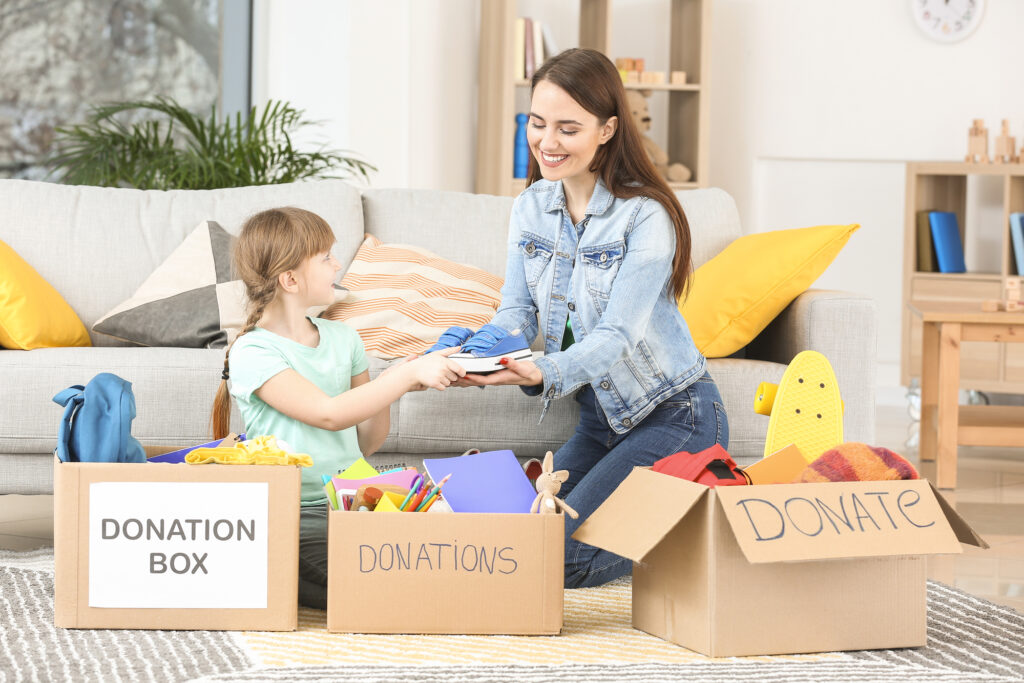Inside: Many people wonder why it is so hard to declutter. Today we will look at the common reasons people struggle to declutter and how to finally overcome decluttering paralysis.
There is a small percentage of the population who enjoy decluttering and don’t have difficulty letting go of stuff. For everyone else, decluttering is a challenge for a variety of reasons.
In order to overcome decluttering paralysis, you need to examine your relationship with stuff.
How you think about what you own and why you’ve been holding onto clutter are important to understand in order to make long-lasting changes in your home.
The good news is you can change your thoughts and behaviors and decluttering gets easier with practice.
In this post we will look at:
- why it’s so hard to declutter
- ways to overcome decluttering paralysis
- how to get started if you’re struggling to declutter

So, Why is It So Hard to Declutter?
There are a variety of reasons you may find it difficult to let things go.
The reality is that clutter isn’t just about the stuff. It has more to do with what those things represent to you.
Here are some common reasons people get so attached to their stuff.
1. Identity
We live in a consumer-driven culture where advertisers are constantly telling us that we are what we own. They sell us on the idea that we’d have a different life if we had the product they are trying to sell.
This results in people’s identities being mixed in what they own. The name-brand label or certain type of car becomes a status symbol. It may serve as a reminder of your accomplishments.
When your stuff becomes part of how you view yourself, it becomes hard to declutter because letting go of things is letting go of part of your identity.
However, you are not what you own and the lessons you’ve learned and the character you’ve developed aren’t diminished when you have less stuff.
2. Security
Another reason why it is so hard to declutter is because people find security in owning stuff. If you’re someone who grew up without, this is particularly challenging.
You begin to view the things you own as a security blanket. You create what-if scenarios in your mind and they become the reason it’s tough to detach.
However, freedom comes with owning less, not being burdened by excess.
3. Comfort
Your things are meant to bring you joy. Some people find lots of joy in having lots of things.
Whether it be collections you own or stuff that serves as a time capsule of your life, some may find it difficult to let go when their things have become a source of comfort to them.
However, keeping the most treasured items can provide the same feeling without it being drowned out by the extra stuff.
4. Emotional attachment
If you’ve inherited items from a loved one who has passed away, you know that stuff becomes representative of emotional attachment.
Even if you don’t love the items themselves, you attach the feelings you had toward the person who owned them and it becomes difficult to let go.
However, it’s important to remember that people are not their things and the times you spent together are no less special when you don’t keep their stuff.
5. Memories
Memories act in a similar way. Items that evoke strong memories are ones that many people find difficult to declutter.
You may feel that letting go of the item erases the memory of that time in your life.
However, the memories can live on without the stuff.

Why Is It So Hard To Get Rid Of Stuff?
If you are struggling to declutter, there is hope. You can move past your decluttering paralysis.
What is Decluttering Paralysis?
Decluttering paralysis is when you become flooded with various thoughts and emotions that prevent you from making any progress decluttering.
Often when people are overwhelmed, the response is to avoid the circumstances that are overwhelming them.
People will put off decluttering because they don’t know where to start and the idea of letting go feels too hard.
How is Decluttering Paralysis Different from Decluttering Depression?
Decluttering paralysis and decluttering depression are two different things. You can be in a variety of emotional states and experience decluttering paralysis.
Decluttering depression is specific to someone who is dealing with situational or clinical depression.
Depression and clutter tend to feed off of each other. When you are depressed, your home is more likely to be cluttered and when your home is cluttered, you’re more likely to be depressed.
If you find yourself in that situation, speaking to a trusted friend or a counselor is a good first step in getting help.
Why Is Decluttering Good For Your Mental Health?
As we just talked about, clutter and depression are linked to each other. Studies have also shown that women experience higher cortisol (the stress hormone) levels when in a cluttered space.
Clutter makes it more difficult to focus and think clearly. There are a variety of benefits that are found in living more simply.
Why Can’t I Declutter?
First, you need to stop telling yourself that you can’t. Your success with the decluttering process is closely linked to how you think about decluttering.
Self-limiting beliefs will slow you down and hamper your progress. While it is helpful to understand how you have struggled with clutter in the past, it is not helpful to tell yourself that you can’t.
You can do hard things.
Why Is Decluttering So Stressful?
Decluttering can be stressful as you unpack the layers to understand why you own what you own. Change often brings challenges as it’s uncomfortable at first.
The accompanying worry about what-ifs can hold you back from making the progress you want to in order to experience the full benefits of decluttering your home.

How Do You Declutter When You Have Trouble Letting Go of Things?
There are a variety of common fears that keep people holding onto clutter. We will talk about four of them here.
In order to overcome decluttering paralysis, you need to first identify why you’ve been keeping clutter in the first place. Notice which of these fears fits your situation.
1. Fear of Throwing Things Away
There are a number of reasons why you may not want to through something away. Your concern may be based on wanting to be a good citizen of the earth.
You don’t your stuff to end up in a dump adding to environmental challenges.
You may also fear throwing out something that you didn’t intend to so it seems easier just to keep it all.
What you have to realize in this scenario is that those items will end up somewhere after you’re gone anyway, so continuing to hold onto them doesn’t solve the problem.
Donating responsibly and being more intentional with what you purchase going forward will better help your things from ending up in a trash heap.
2. Fear of What If I Need This One Day?
Another reason that many people hold onto clutter is that they’re concerned that they might want that item someday. No one wants to regret getting rid of something or ending up needing to replace it.
People create all sorts of someday when and what-if scenarios. Often they are quite improbable situations.
The problem with holding onto many items that you have very little chance of actually needing or using is that it negatively impacts your home now. Be really honest with yourself about how likely you are to use those someday items.
3. Fear of Feeling Loss
If you’ve inherited the belongings of a loved one after they’ve passed, decluttering can be an emotionally difficult process.
It takes time and emotional energy to separate the memories of a person from their stuff. Dealing with loss is hard on its own.
You can declutter their things in time as you cling to what you learned and shared with that person while they were here.

4. Fear You’ll Make Someone Mad
Have you ever been gifted something by a friend or relative who you thought would look for it when they visited you next time?
Perhaps the gift was something that wasn’t well suited to you or your home, but you feel bad letting it go because it was a gift.
The purpose of gifts is to bless the recipient. If it isn’t benefitting your life, don’t feel bad letting it go.
Don’t keep gifts out of guilt and don’t let anyone make you feel bad about not holding onto something they gave you that became clutter.
How to Overcome Decluttering Paralysis
While decluttering may feel hard initially, it is possible to overcome decluttering paralysis.
Reframing how you think about what you declutter vs keep will help you to overcome decluttering paralysis.
It’s also important to learn how to let go of guilt, which can hold you back from making progress decluttering.
And the final key to overcoming decluttering paralysis is to simply take action. The first step can be the most challenging, but as you get going it becomes easier.
How to Decide What to Keep When Decluttering
People often think of decluttering in terms of what they are getting rid of. However, when you focus instead on what you want to keep, it becomes a different process.
You can overcome decluttering paralysis by reframing your thinking about decluttering and considering these three things before you start the process.
Qualifications
Consider ahead of time, what clutter is to you. You can use these questions to help you determine what’s become clutter in your home.
When you establish ground rules ahead of time, you’re less likely to get sucked into an emotional decision about an item.
Boundaries
Decide on physical boundaries for your stuff ahead of time as well. For example, you may have three boxes designated for your photos. This provides a physical limit on how many pictures you can keep.
Also, allow the rooms in your home to act as a guide so that you do not keep too much for your space. If you have more stuff than can fit in the room it should go in, that tells you it needs to be decluttered more.
Habits
Decluttering is not a one-and-done process. It is an ongoing journey that requires maintenance and changing your habits.
Adjusting your daily habits as well as your shopping habits can help to stop the cycle of clutter in your home. You’ll become more selective with what you keep with time and practice.

How to Stop Feeling Guilty When Decluttering:
It’s time to stop feeling guilty about the items that you do (or don’t) keep in your home. Focusing on guilt will keep you stuck in decluttering paralysis.
Decluttering is about freeing yourself from the burden and weight of the excess stuff in your home.
Guilt has no place here, so agree to stop:
Feeling Like a Heel over Heirlooms
If you happen to be the one in the family who is stuck with the family heirlooms no one else wanted, don’t feel bad if they are not something you want to keep either.
Guilt is not a good motivator for hanging onto anything. Keep what you love and don’t keep what you don’t. You are not obligated to hold onto other people’s stuff.
Guilt Over Gifts That Were Given to You
In the same vein, don’t keep things just because they were gifted to you. A gift is meant to benefit your life, not burden it.
If the item isn’t a fit for your life, feel good about giving it to someone who will actually enjoy it and make use of it.
Sad Over Money Spent
Buyer’s remorse is a very real thing. Don’t keep something just because it was expensive. If you aren’t using it, then it’s just serving as a painful reminder of a past purchasing regret.
If you want to resell it, fine, but be realistic with your expectations. Most things do not retain much value after being purchased.
Terrible for Tossing Toys
This is not to give you license to toss your kids toys without their knowledge or involvement. They should be part of the decluttering process so they can learn how to manage their own stuff starting at a young age.
You shouldn’t feel bad about them letting go of their things though. Studies show that children benefit from having fewer toys to choose from.
Sucker for Sentimental Value
Decluttering can turn into a trip down memory lane which can significantly slow the process that you make. It’s not that you can’t keep anything of sentimental value, but being selective and knowing what you are keeping and why is ideal.

Where to Start When You’re Paralyzed By The Mess
If you’ve been feeling overwhelmed by your stuff, these tips will help you to get started.
1. Set your goals
To overcome your decluttering paralysis, you need to get clear on what your end goals are for your home. Think about how you want your home to look, feel, and function when you are done and write it down.
You’ll be more motivated to overcome your decluttering challenges when you’ve created goals that are really important to you.
2. Start small
Instead of thinking about everything that needs to be decluttered or focusing on the most dreaded area in your home (often the garage), focus on taking just one small step.
Work on one drawer or shelf. Start with easy items. Don’t try to overdo it.
3. Set a timer
Are you competitive?
Try setting a timer for ten minutes and challenge yourself to see how much you can get done in that time. You may surprise yourself!
4. Stay consistent
Continue working on small areas consistently. Try setting that ten minute timer each day and see how it all adds up.
Consistency is key to completing the decluttering process.
5. Pair it with something fun
I realize decluttering doesn’t immediately seem enjoyable to everyone, but if you pair it with something you do enjoy you’ll find yourself looking forward to it instead of avoiding it.
Listen to a podcast, an audiobook, or music you enjoy while decluttering and that time will pass by more quickly.
6. Celebrate your victories
Most people don’t do a great job at acknowledging their progress. People tend to focus on how much more there is to go rather than how far they’ve come.
Celebrate your victories, big and small, along the way. It makes for a more enjoyable journey.

Decluttering Doesn’t Have to Be Hard. You Can Overcome Decluttering Paralysis.
The toughest part of decluttering is usually getting started. Once you’re able to get started, the process gets easier as you practice and get quicker at making decisions.
If you want some help getting started, sign up on the form below and get the free Decluttering Jumpstart that includes 100 easy items to declutter from your home and 12 high-impact areas to declutter quickly! You’ll also get weekly simplifying and decluttering tips sent straight to your in box!


Great article. Twice I’ve had to go through my mom’s stuff (first when she went from the hospital to an assisted living facility) and when she died and we had to clean her room. The first time forced me to take a look at ‘my stuff’. and I came home and started cleaning and clearing. One big realization I had was that I am an information hoarder. I have kept information sheets, exercise sheets, programs, etc. etc. etc.
When I first started facilitating, there was no internet, so I kept everything, just in case. It was sorted, filed and cross-referenced. And I hadn’t looked at it for years!!! So I threw it all out, except for a few things I scanned and saved digitally.
With physical stuff, I had to get over the ‘what if I need it someday?” thoughts. I realized that was a scarcity mindset. Besides, I’d saved so much I wouldn’t be able to find anything specific. So out it went, after my epiphany about mom’s stuff.
lots of food for thought – I think I have to declutter on a continual basis, because it’s easy to add to my ‘stuff’ without throwing out.
I also hoard information as well as books. I think I want to get around to reading them all and children’s books for my grandkids are the hardest.
Thank you one of the best articles on clutter both tips tips. insights and motivation!
I’m so glad it was helpful for you!
This is one of the best articles I’ve read on the subject. I’m a little relieved I’m not the only one who struggles with this
I’m glad the post was helpful for you, Kristina!
The most difficult thing to throw out is books, and sentimental items from my husband who passed six years ago. I realize those items will never bring him back however, I can’t part with those items.
I am so sorry for your loss, Margaret.